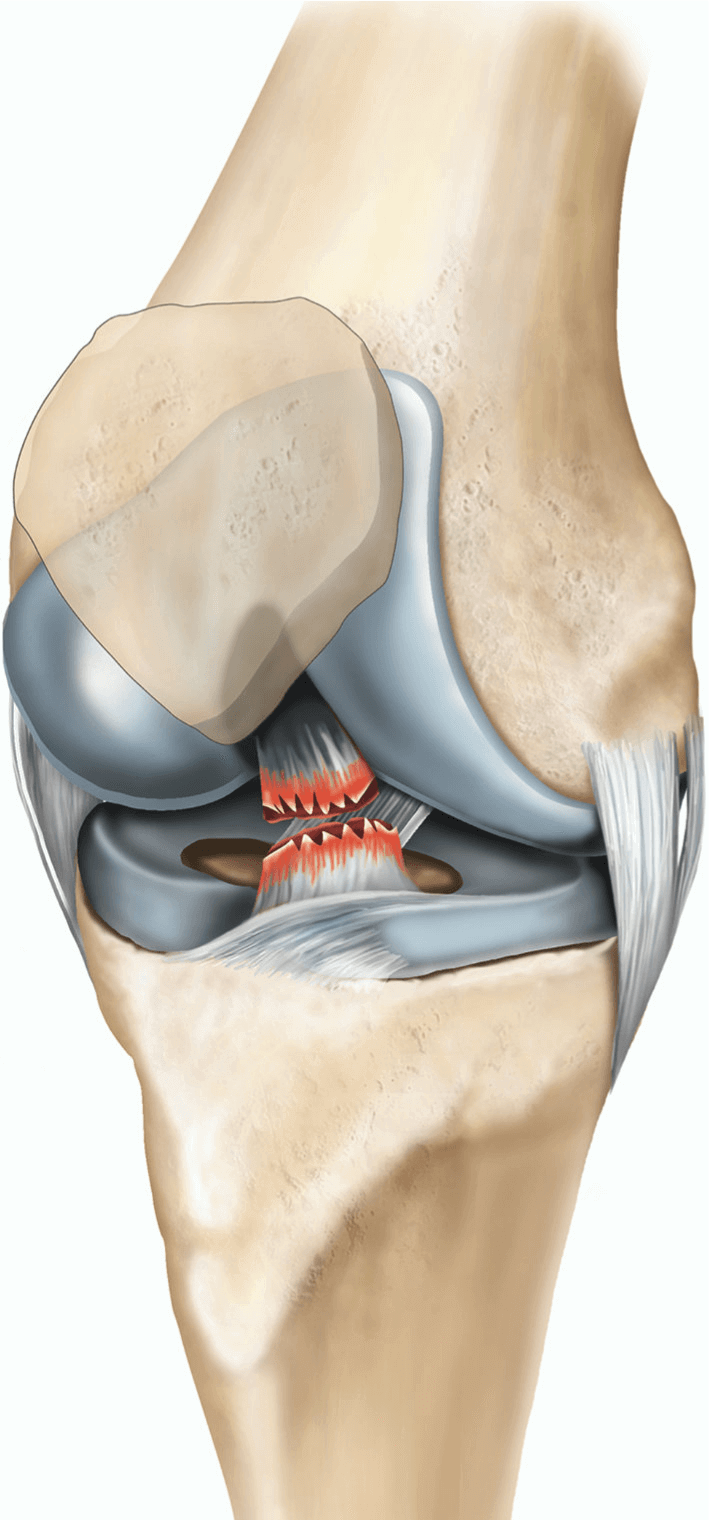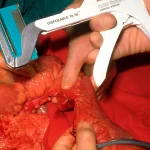- What is the anterior cruciate ligament?
The anterior cruciate ligament (ACL) is one of the important ligaments that stabilise your knee. If you have torn (ruptured) this ligament, your knee can collapse or ‘give way’ when making twisting or turning movements.
An ACL rupture happens as a result of a twisting injury to your knee. The common causes are contact sports and skiing injuries.You can injure other parts of your knee at the same time such as tearing a cartilage (meniscus) or damaging the joint surface.
What are the benefits of surgery?
Your knee should not give way any more. This will allow you to be more active and you may be able to return to some of or all your sporting activities.
Are there any alternatives to surgery?
The physiotherapist can give you exercises to strengthen and improve the co-ordination of the quadriceps and hamstring muscles in your thigh.
Wearing a knee brace can sometimes help if your knee only gives way while you are playing sports.

A torn ACL. - What will happen if I decide not to have the operation or the operation is delayed?
- Unless you are a high-level athlete, there is a 4 out of 5 chance that your knee will recover to near normal without surgery. High-level athletes do not usually do well without surgery.
- If your knee continues to give way, you can get a torn cartilage (risk: 1 in 30). You will usually need another operation to remove or repair the torn piece of cartilage.
- If you have increased pain or swelling in your knee, contact your healthcare team.
- What does the operation involve?
- Various anaesthetic techniques are possible.
- The operation usually takes an hour to 90 minutes.
- Your surgeon will make one or more cuts around your knee. Most surgeons perform the operation by an arthroscopy (keyhole surgery), using a camera to see inside your knee.
- Your surgeon will replace the ACL with a piece of suitable tissue (a graft) from another area of your body.
- The top and bottom ends of the replacement ligament are fixed with special screws or anchors into holes drilled in the bone.
- How can I prepare myself for the operation?
- If you smoke, stopping smoking now may reduce your risk of developing complications and will improve your long-term health.
- Try to maintain a healthy weight. You have a higher risk of developing complications if you are overweight.
- Regular exercise should help to prepare you for the operation, help you to recover and improve your long-term health. Before you start exercising, ask the healthcare team or your GP for advice.
- If you have not had the coronavirus (COVID-19) vaccine, you may be at an increased risk of serious illness related to COVID-19 while you recover. Speak to your doctor or healthcare team if you would like to have the vaccine.
- What complications can happen?
- Some complications can be serious and can even cause death.
- General complications of any operation
- bleeding
- infection of the surgical site (wound)
- allergic reaction to the equipment, materials or medication
- blood clot in your leg
- blood clot in your lung
- difficulty passing urine
- chest infection
- Specific complications of this operation
- break of your kneecap
- damage to nerves around your knee
- infection in your knee
- discomfort in the front of your knee
- loss of knee movement
- your knee keeps giving way
- severe pain, stiffness and loss of use of your knee
- Consequences of this procedure
- pain
- unsightly scarring of your skin
- How soon will I recover?
- You should be able to go home the same day or the day after.
- Your surgeon may want you to wear a knee brace for a few weeks. Once your knee is settling down you will need to start intensive physiotherapy treatment.
- Regular exercise should help you to return to normal activities as soon as possible. Before you start exercising, ask the healthcare team or your GP for advice.
- Most people make a good recovery after an ACL reconstruction but this takes hard work.
- It is unlikely that your knee will ever be as good as it was before the original injury.


